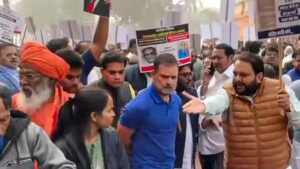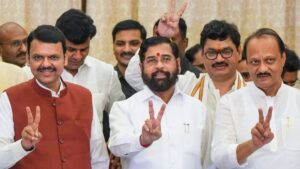Jagdeep Dhankhar Vs Opposition: What Next For Vice-President After Motion For Removal?

Last Updated:
Opposition’s motion of removal against Jagdeep Dhankhar: The notice, as per article 67(B) of the Constitution, will have to be put to vote first in the Rajya Sabha and, if needed, later in the Lok Sabha
Jagdeep Dhankhar has become the first Vice-President in the history of Independent India to face such a motion for removal. (PTI File)
A total of 60 MPs from opposition parties have submitted a notice to the Rajya Sabha Secretary General, demanding a motion for removal of Rajya Sabha chairman and Vice-President Jagdeep Dhankhar
The MPs from the Congress, Trinamool Congress (TMC), Samajwadi Party (SP), Dravida Munnetra Kazhagam (DMK) and other INDIA bloc allies have alleged that Dhankhar’s conduct is biased and therefore unbecoming of his position as the chairperson of the Rajya Sabha.
Article 67(b) of the Constitution of India states that the Vice-President can be removed from office by a resolution of the council of states. The resolution must be passed by a majority of the council of states and agreed to by the House of the People. Before a resolution can be moved, at least 14 days’ notice must be given of the intention to move the resolution.
For the first time in the 72-year history of the Rajya Sabha, Opposition Parties have formally submitted a no-confidence motion against the Chairman.There have been three occasions, however, when a no-confidence motion has been moved against the Speaker of the Lok Sabha. pic.twitter.com/DHjo5vqL2K
— Jairam Ramesh (@Jairam_Ramesh) December 10, 2024
WHAT NEXT?
The notice, as per article 67(B) of the Constitution, will have to be put to vote first in the Rajya Sabha and, if needed, later in the Lok Sabha.
Constitutional expert P D T Achari told News18 that the Rajya Sabha rule book makes no mention of any provision for removal of the chairperson. However, article 67 of the Constitution provides for the procedure for impeachment of the Vice-President of India. “The motion moved by the opposition will have to be put to vote in the Rajya Sabha. If a majority votes in favour, then it will be sent to the Lok Sabha. The Vice-President can be removed only if a majority of members in both the houses vote to impeach him,” Achary said.
#WATCH | On Opposition’s no-confidence motion against Rajya Sabha Chairman Jagdeep Dhankhar, Congress MP Jairam Ramesh says, ” In the last 72 years, it is the first time that Opposition parties have submitted a motion over Rajya Sabha Chairman. This shows how the situation has… pic.twitter.com/ySiO4r8D7u— ANI (@ANI) December 10, 2024
GOVERNMENT’S STAND
Parliamentary affairs minister Kiren Rijiju condemned the move by the INDIA bloc, but said the government did not have a problem in accepting the notice and getting it voted upon. Rijiju, however, pointed out that the National Democratic Alliance (NDA) enjoys a majority in Parliament and all NDA MPs have full faith in the chairperson. “This notice is a diversionary tactic because the Congress is scared and disturbed over the Soros revelation. Dhankhar is a Jat, son of a farmer. We condemn this move to target him,” Rijiju said.
14 DAYS REQUIREMENT
As per article 67, a 14-day notice must be given before any resolution to remove the Vice-President is voted upon. Achari clarified that although this is an unprecedented situation, a bare reading of the Constitution suggests that the resolution moved by the opposition can be taken up in the next session of Parliament as less than 10 working days remain in the winter session. “A special session of the two houses can be called or the notice can be voted upon in the next session,” he told News18.
UNPRECEDENTED MOVE
Dhankhar has become the first Vice-President in the history of Independent India to face such a motion for removal. The numbers in both the Rajya Sabha and Lok Sabha favour the ruling side, but the opposition insists on “putting on record the bias of the Chair”.
“As Chairperson, the manner in which Shri Jagdeep Dhankhar conducts parliamentary affairs of the Rajya Sabha is extremely partisan. It is a matter of record that Shri Jagdeep Dhankhar has repeatedly interrupted members of the Opposition while they are speaking, unfairly used privilege motions to silence leaders of the opposition, and openly delegitimized dissent with respect to the actions of the Government in the utmost disparaging manner,” the notice alleges.
It adds that his open praise for the Rashtriya Swayamsevak Sangh (RSS) and calling himself an “Ekalavya of the RSS” is proof of his bias. Rijiju dismissed the charge and said there was nothing wrong with praising an organisation like the RSS.



